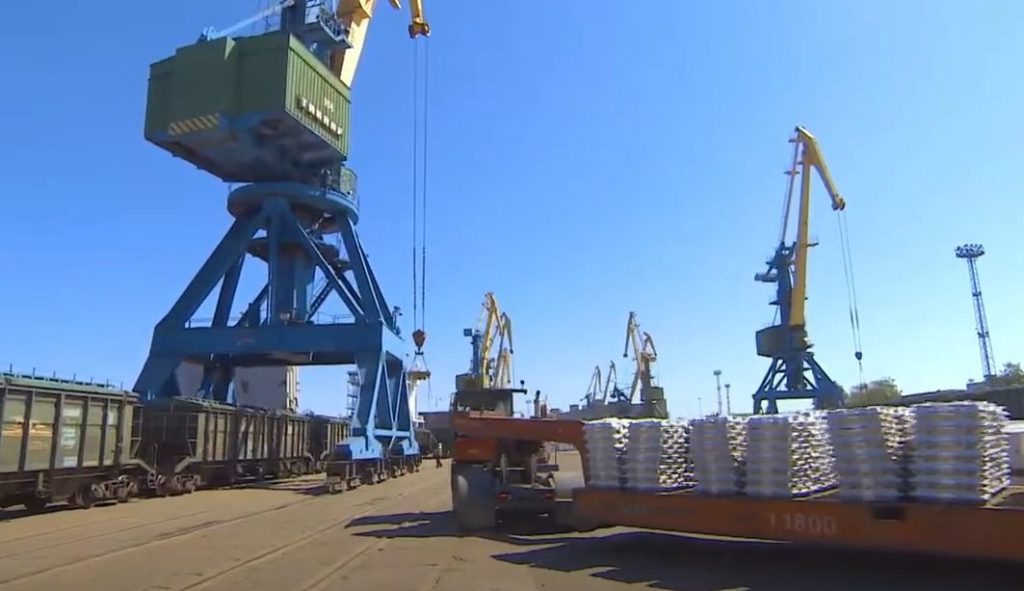Russian Logistics Firm Asks Moscow to Legalize Crypto Payments

The Russian logistics firm ETE Group has asked Prime Minister Mikhail Mishustin to let domestic firms use crypto as a payments tool in overseas trade deals.
Per Gazeta.ru, ETE wrote to Mishustin to ask him to “develop a regulatory framework for settlements with foreign suppliers in digital currencies, including cryptocurrency.”
ETE said it wanted the government to “make changes to the Russian Civil and Tax Codes.
Russian Logistics Players Looking to Crypto
It also wants Moscow to amend “other regulatory legal acts,” including the federal law that governs currency control.

The company is based in Moscow and the Far Eastern city of Vladivostok and has almost 500 corporate clients.
It specializes in cargo shipments to nations like China, India, and Türkiye, as well as South East Asian countries.
The company wants Mishustin to help establish a legal status for cryptoassets. It also called on the government to create formal protocols for crypto’s “issuance, circulation, and accounting.”
And ETE called on the Prime Minister to clarify regulations pertaining to platforms (crypto exchanges) and name the “state body that will control [crypto] transactions.”

The company noted that in 2024, business sector interest “in making [crypto] payments abroad increased by 40%.”
The firm suggested that while Russian companies are “allowed to make international payments in cryptocurrency,” the process “carries risks for businesses due to the lack of a regulatory framework.”
It added that crypto payments help domestic firms “solve problems with foreign payments.”
Sanctions Driving Russian Trade Firms to Tokens
Russian companies are believed to have started using crypto as a payment tool shortly after the outbreak of war in Ukraine in February 2022.
The US, the EU, and the UK have since imposed sanctions on Russian trading companies and banks, which they have also disconnected from the SWIFT network.
Officially, Russian trade firms must use the Central Bank’s sandbox program to conduct cross-border trade in crypto.
However, scores of companies are widely thought to be trading outside the sandbox, apparently with Moscow’s unspoken blessing.
This has led to uncertainty in the sector, however. Many companies are still reluctant to use crypto, as tokens are still largely unregulated in Russia.
Fresh EU Sanctions in Pipeline
With the EU currently drafting its 17th sanctions package against Russia, and Washington also discussing sanctions “pressure,” more Russian companies are looking for dollar-free trade options.
ETE noted that “sanctions against Russian financial institutions hinder settlements with foreign suppliers.”
It claimed that payments between firms in Russia and China often face delays, ranging “from five days to several months.”
Similar situations are also frequent in trade deals between Russia and Kazakhstan, the company added.
ETE said that the length of the delays “extends with each new sanctions package.”
Russia-Kazakhstan payments take “at least two to three weeks” to complete, “depending on the payment code, the recipient bank, and accompanying documents,” the firm said. ETE explained:
“The situation today is complicated by the inclusion of not only large Chinese banks in America’s [sanctions regime scrutiny], but also municipal institutions. The slightest suspicion of a payer’s connection with Russia will lead to the credit institution refusing to credit the payment to the recipient’s bank account and returning it. This process can take anything from two or three weeks to several months.”
The firm remarked that Russian law stipulates that crypto “cannot be used to pay for goods, since the ruble remains the [sole] official currency.”
The investment firm VanEck this week claimed it had seen evidence that Russia and China are using Bitcoin (BTC) to settle energy trade payments.
The post Russian Logistics Firm Asks Moscow to Legalize Crypto Payments appeared first on Cryptonews.
Read More

Justin Sun Denies Knowledge of CZ Plea Deal Allegations, Reaffirms Trust in DOJ
Russian Logistics Firm Asks Moscow to Legalize Crypto Payments

The Russian logistics firm ETE Group has asked Prime Minister Mikhail Mishustin to let domestic firms use crypto as a payments tool in overseas trade deals.
Per Gazeta.ru, ETE wrote to Mishustin to ask him to “develop a regulatory framework for settlements with foreign suppliers in digital currencies, including cryptocurrency.”
ETE said it wanted the government to “make changes to the Russian Civil and Tax Codes.
Russian Logistics Players Looking to Crypto
It also wants Moscow to amend “other regulatory legal acts,” including the federal law that governs currency control.

The company is based in Moscow and the Far Eastern city of Vladivostok and has almost 500 corporate clients.
It specializes in cargo shipments to nations like China, India, and Türkiye, as well as South East Asian countries.
The company wants Mishustin to help establish a legal status for cryptoassets. It also called on the government to create formal protocols for crypto’s “issuance, circulation, and accounting.”
And ETE called on the Prime Minister to clarify regulations pertaining to platforms (crypto exchanges) and name the “state body that will control [crypto] transactions.”

The company noted that in 2024, business sector interest “in making [crypto] payments abroad increased by 40%.”
The firm suggested that while Russian companies are “allowed to make international payments in cryptocurrency,” the process “carries risks for businesses due to the lack of a regulatory framework.”
It added that crypto payments help domestic firms “solve problems with foreign payments.”
Sanctions Driving Russian Trade Firms to Tokens
Russian companies are believed to have started using crypto as a payment tool shortly after the outbreak of war in Ukraine in February 2022.
The US, the EU, and the UK have since imposed sanctions on Russian trading companies and banks, which they have also disconnected from the SWIFT network.
Officially, Russian trade firms must use the Central Bank’s sandbox program to conduct cross-border trade in crypto.
However, scores of companies are widely thought to be trading outside the sandbox, apparently with Moscow’s unspoken blessing.
This has led to uncertainty in the sector, however. Many companies are still reluctant to use crypto, as tokens are still largely unregulated in Russia.
Fresh EU Sanctions in Pipeline
With the EU currently drafting its 17th sanctions package against Russia, and Washington also discussing sanctions “pressure,” more Russian companies are looking for dollar-free trade options.
ETE noted that “sanctions against Russian financial institutions hinder settlements with foreign suppliers.”
It claimed that payments between firms in Russia and China often face delays, ranging “from five days to several months.”
Similar situations are also frequent in trade deals between Russia and Kazakhstan, the company added.
ETE said that the length of the delays “extends with each new sanctions package.”
Russia-Kazakhstan payments take “at least two to three weeks” to complete, “depending on the payment code, the recipient bank, and accompanying documents,” the firm said. ETE explained:
“The situation today is complicated by the inclusion of not only large Chinese banks in America’s [sanctions regime scrutiny], but also municipal institutions. The slightest suspicion of a payer’s connection with Russia will lead to the credit institution refusing to credit the payment to the recipient’s bank account and returning it. This process can take anything from two or three weeks to several months.”
The firm remarked that Russian law stipulates that crypto “cannot be used to pay for goods, since the ruble remains the [sole] official currency.”
The investment firm VanEck this week claimed it had seen evidence that Russia and China are using Bitcoin (BTC) to settle energy trade payments.
The post Russian Logistics Firm Asks Moscow to Legalize Crypto Payments appeared first on Cryptonews.
Read More

